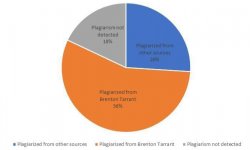Buffalo Supermarket Shooter Plagiarized 80% of Rationale Section of Manifesto from Hate Sites, Study Shows
Research shows the dangerous impact of unmoderated extremist online content
Posted in: Communication and Media, Press Releases, Research

A new study by Daniela Peterka-Benton from the Department of Justice Studies and Bond Benton from the Center for Strategic Communication at Montclair State University demonstrates the extent to which Buffalo mass shooter Payton Gendron’s manifesto – the public statement for why he perpetrated the attack – was derived from hate content he consumed online.
Specifically, the study showed over 80% of the rationale sections in Gendron’s manifesto came from extremist spaces he reported visiting.
“The results present evidence that unmoderated online content poses real risks,” said Justice Studies Professor Daniela Peterka-Benton.
Online Content and Extremist Radicalization
The study, available to read in full in the Journal for Deradicalization, used analytic software to assess textual authorship with results confirming content was substantially copied and pasted from the sources Gendron identified. The researchers also scraped 62 images from the document and used analysis programs to identify the online locations that have hosted these images.
The data collected and analyzed demonstrates the extent to which radical material he consumed influenced manifesto content.
Highlights from the study analyzing the ‘rationale’ sections of the manifesto include:
- At least 82% of the rationale sections of Gendron’s manifesto were plagiarized
- Over 56% was taken from manifestos of other white nationalist attackers
- Another 26% was copied from white supremacist sites
- 95% of the images studied were copied directly from hate and extremist sites
- 4chan hosted 69% of the images Gendron used for his rationale
Combating Online Hate Speech with Media Literacy
“The internet has long been an unchecked playground for extremists and hate groups,” said Peterka-Benton, who co-authored the study with Bond Benton, a researcher in the School of Communication and Media at Montclair State University.
“People can be pulled into those hateful spaces, and it can define how they see the world. This was especially true during the COVID-19 pandemic, as young people like Gendron were online for vast portions of the day,” said Benton.
Ultimately, the results represent a call to action for improved media literacy. “From parents to online consumers, we need to be critical about the content we consume – particularly when we are just a few clicks away from the worst messages imaginable,” said Peterka-Benton.
For more information or to set up an interview, contact the Media Relations team at Montclair State University.
